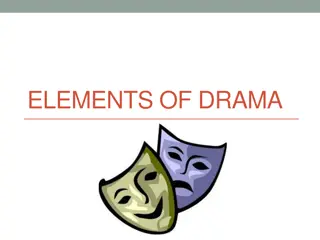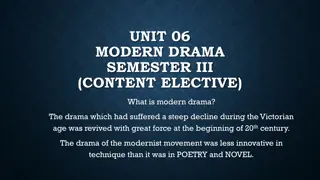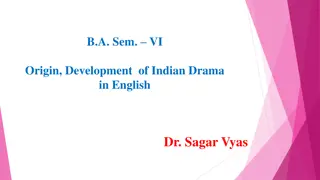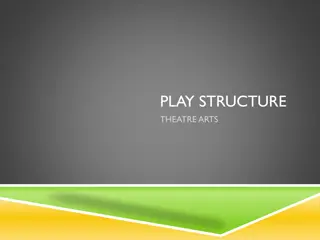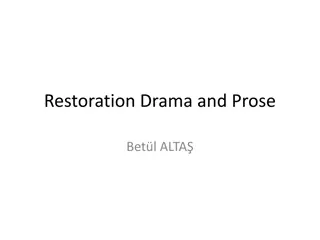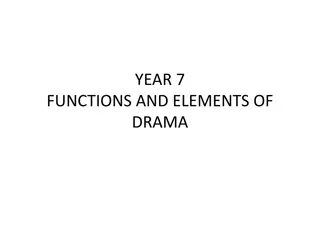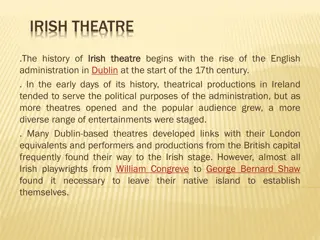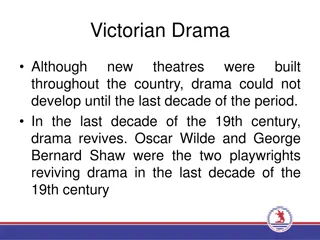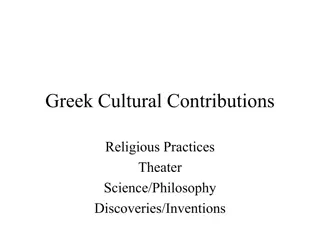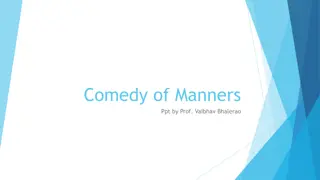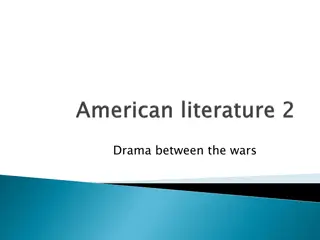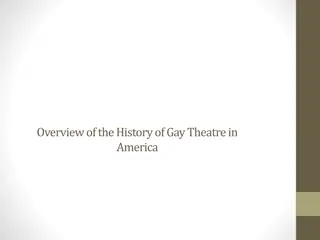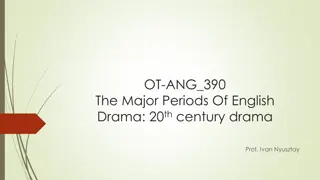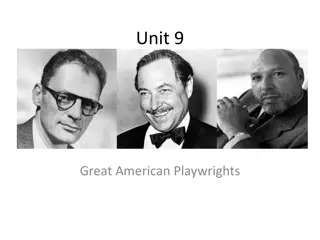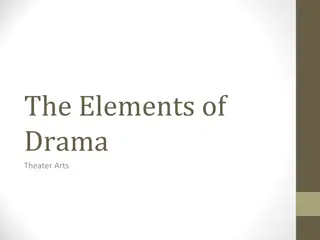Understanding the Elements of Drama and Theater History
Drama, originating from the Greek verb "dran," involves acting and storytelling in front of an audience. Explore the key aspects, from the Globe Theater in London to dramatic structure, actors, and speech forms like dialogue and monologue. Learn about the crucial components such as playwrights, acto
4 views • 22 slides
Exploring Modern Drama: History and Characteristics
Modern drama, revived in the early 20th century after a decline in the Victorian age, encompasses realism, plays of ideas, romanticism, and poetic elements. English drama during the modernist period is categorized into phases marked by influential playwrights like Henrik Ibsen, G.B. Shaw, T.S. Eliot
0 views • 9 slides
Origin and Development of Indian Drama in English
Indian English Drama has a rich history, starting from the Sanskrit plays of the Vedic Age to prominent playwrights like Rabindranath Tagore and Sri Aurobindo Ghosh. The genre saw a resurgence in the 20th century with significant contributions from various playwrights marking its evolution through s
0 views • 8 slides
Understanding the Structure of Plays in Theatre Arts
Playwrights express ideas and convey messages through the structure of their plays. Analyzing a play's parts, arrangement, and meaning helps audiences grasp the central themes and messages. Key elements like the opening situation, initial incident, rising and falling action, climax, denouement, conf
0 views • 13 slides
Exploring Restoration Drama and Prose in the Era of Charles II
In 1660, with Charles II's ascent to the throne, Restoration literature saw a revival alongside the political landscape. Playwrights like John Dryden and Thomas Otway contributed significant works, with genres ranging from heroic plays to satirical comedies. The era also witnessed the emergence of t
1 views • 12 slides
Understanding the Functions and Elements of Drama in Year 7 Curriculum
Explore the functions and elements of drama with Year 7 students in this engaging lesson. Understand how drama educates, informs, entertains, promotes tolerance, and more. Dive into the key elements like script, plot, diction, characterization, actors, and stage. Learn about playwrights and categori
0 views • 9 slides
History and Evolution of Irish Theatre
Irish theatre has a rich history intertwined with politics and cultural developments. From serving political purposes in the 17th century to nurturing indigenous writers and performers in the 20th century, Irish theatre has seen significant evolution. Dublin has been a key hub for theatrical product
0 views • 24 slides
Revival of Drama and Poetry in Victorian Era
Drama in the Victorian era saw a revival in the last decade of the 19th century with playwrights like Oscar Wilde and George Bernard Shaw. Alongside, Victorian poetry explored themes of love and time in various aspects, with poets like Lord Alfred Tennyson experimenting with narrative poems and dram
1 views • 6 slides
Insights into Greek Theatre's Renowned Playwrights and Dramatic Elements
Greek theatre history and key figures, including important playwrights like Aeschylus, Sophocles, and Euripides. Aristotle's theories on drama elements, Thespis' innovations, and Aristotle's Unities of Drama are explored. The impact of these elements and playwrights on ancient Greek theatre is highl
7 views • 9 slides
Greek Cultural Contributions: From Olympics to Theater
Ancient Greek civilization made significant cultural contributions in various aspects such as religious practices, theater, and scientific discoveries. The Greeks had a rich tradition of honoring their gods through events like the Olympics and theatrical performances that continue to fascinate audie
4 views • 26 slides
Greek Tragedy: From Oedipus Rex to Sophocles' Legacy
Greek tragedy, rooted in societal changes of Greek culture, explores the arrogance of tragic protagonists like Oedipus. The form and structure of tragedies aim to evoke catharsis in audiences through a journey of fear and emotions. Playwrights like Aeschylus, Euripides, and Sophocles contributed dis
0 views • 13 slides
Exploring the Comedy of Manners in English Literature
Comedy of manners is a genre of realistic, satirical comedy that critiques the social conventions and manners of sophisticated societies. Originating in Classical Greece and flourishing during the Restoration period in England, it employs witty dialogue and clever plots to offer social commentary. N
1 views • 6 slides
Drama Between the Wars: Evolution of American Theater
Exploring the evolution of American drama between the wars, from the Puritan rejection of theater to the emergence of American playwrights and the influence of European masters. The rise of popular forms like vaudeville and the impact of theatrical companies post-WWI, with a focus on key figures lik
0 views • 10 slides
Redefining Irish Identity in a Globalized World
Exploring the complexities of Irish identity in a post-colonial, globalized society through the lenses of cultural fragmentation, intercultural exchange, and the evolving narratives of contemporary Irish playwrights. The discourse delves into the challenges of maintaining a distinct Irish identity w
2 views • 15 slides
Evolution of Gay Theatre in America
Gay theatre in America has overcome societal challenges, censorship, and stereotypes to emerge as a vibrant and essential part of the theatrical landscape. From the early struggles of gay playwrights like Oscar Wilde and Tennessee Williams to the groundbreaking works of the Caffe Cino and the impact
0 views • 6 slides
Exploring the Evolution of English Drama in the 20th Century
In the realm of English drama in the 20th century, significant periods such as Modern British Drama, Naturalism, and the works of George Bernard Shaw shaped the theatrical landscape. From the rejection of past ideals to the emergence of new social commentary, playwrights like Shaw and Ibsen challeng
0 views • 39 slides
The World of Restoration Comedy: Satire and Society in 17th Century London
The Restoration era saw the rise of Comedy of Manners, reflecting the upper class lifestyle with wit and satire. Playwrights like William Wycherley and William Congreve crafted plays that critiqued societal norms, focusing on themes of love, marriage, and social conduct in London. The plays feature
0 views • 4 slides
Comedy Evolution in Restoration Drama
Explore the evolution of comedy in Restoration drama, from the types of comedy to the major playwrights and their contributions. Learn about the dramatic and theatrical themes, conventions, and trends of the period 1660-1709, including the shift towards humane intrigue comedy and the influence of Sp
0 views • 15 slides
Evolution of Great American Playwrights: Ibsen to Williams
Great American playwrights like Henrik Ibsen, Eugene O'Neill, Tennessee Williams, and Arthur Miller have made significant contributions to the world of theatre. They have explored timeless themes such as human behavior, society, and the struggle between illusion and reality. With regional connection
0 views • 14 slides
Understanding Drama: The Art of Theater Expression
Drama, originating from the Greek word "Dran" meaning to act, is a form of storytelling performed in front of an audience. It differs from prose and poetry by providing a unique experiential aspect through live enactments. Essential elements such as playwrights, actors, acts, scenes, and dramatic sp
0 views • 15 slides
